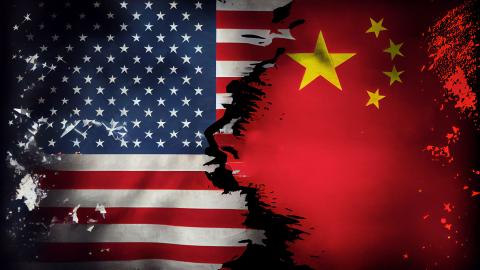Middle East Thrown into Geo-Political ‘Tug of War’ After US Syria Pullout
NORTHEAST SYRIA – After President Donald Trump's announcement of a pullout of US troops, a geopolitical tug of war began over northeast Syria. The winner could largely determine the future and fate of the Middle East.
The main players are a threatening lineup including Turkey’s President Recep Tayyip Erdogan, Russian president Vladimir Putin, Syrian president Bashar al-Assad and Iran’s Supreme Leader Sayyid Ali Hosseini Khamenei. All want to fill any void left by the exit of US troops.

Their opponents are leaders of a new, largely democratic government inside northeast Syria. it includes Christians, Arabs, Kurds, and other ethnic groups. They say Trump’s surprise decision left them at the mercy of the larger nations around them.
“The people in this area are very frightened by the decision of the American pullout because a lot of countries and militias are coveting the region east of the Euphrates to replace the American; Russia, the Assad regime, Iran and Turkey or the Nasra Front that have declared publicly that they will support Turkey on their attack of the east of the Euphrates,” Amina Omer, co-chair of the Council of Democratic Syria, told CBN News.

Abed al-Mehbash, co-chair of the Sanes Executive Council, agrees.
“The decision by President Trump for the withdrawal of the US troops was a decision not at a good time and it wasn’t coordinated with us if we are ready or not ready. This decision had really negative consequences on the council,” he said.
Most see Turkey as their main threat.
"Turkey is so dangerous because it has been the new and the old enemy for our people. From the before the revolution and now. Erdogan wants to take our area, to make it to him with the Turkish government,” Syrian Democratic Forces Captain Aram told CBN News.
Then, Syria and Russia came courting, hoping to build a relationship. Yet if this new government were to align with Assad and Putin, the regional chess game could increase the threat to Israel.
That’s because an alliance between this newly formed government and Syria could provide Iran with a much larger route to transport weapons and supplies to Hezbollah in Lebanon. This would also complete Iran’s desire for a land bridge to the Mediterranean.
Israel is already fighting to keep Iran from basically transforming Syria into its own military base on Israel’s northern border. within just the past year, Israel has launched more than two hundred strikes at Iranian targets within Syria. With both Israel and Iran promising to hit each other harder, any influx of weapons could turn this simmering conflict into all-out war.
Earlier this month, Secretary of State Mike Pompeo explained what happens when the US leaves a power vacuum.
"We learned that when America retreats, chaos often follows. When we neglect our friends, resentment builds. And when we partner with our enemies they advance,” he said during a speech at The American University in Cairo.

“If the Americans go out and there’s no agreement on the political front, for sure, that's going to cause a lot of chaos in the area and that chaos will cause a lot of conflicts in the region,” said Omer.
Pompeo also said America is a force for good in the Middle East. That's the ultimate hope for this new group of leaders.
“Your partners that have fought the terrorism and ISIS side by side with our united Syrian Democratic Forces alongside American forces. Now the war is still going on and these Syrian Democratic Forces have given more than eight thousand martyrs for the sake of fighting ISIS. So how do you give up on them that easily?” Omer added.
The question of who will win the tug of war and fill the void here remains in doubt. Indications are whoever prevails will command the driver’s seat for the future course of the Middle East, Israel and perhaps, the world.




